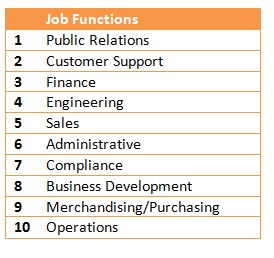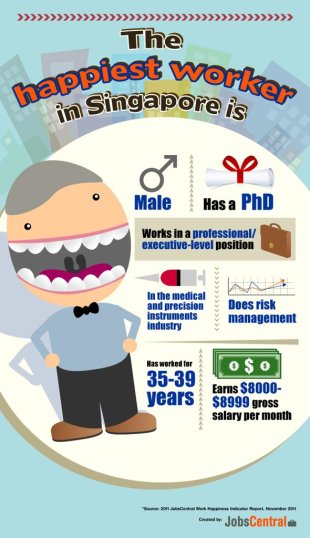By Juliet Soh
Public relations professionals are found to be the unhappiest workers in Singapore for two years in a row, according to an annual survey by JobsCentral, one of Singapore's leading job portals.
A total of 2,385 respondents took the 2011 JobsCentral Work Happiness Indicator Survey, which was conducted online from August to September this year. This survey has been conducted every year since 2009.
PR professionals scored 53.5 in the JobsCentral Work Happiness Indicator this year and 50.4 last year, also the lowest score in 2010.
The top 10 job functions with the unhappiest workers in Singapore are:
The JobsCentral Work Happiness Indicator Survey also found out that Singapore workers are generally happier than they were compared to previous years.
This year, the overall average Work Happiness Indicator score of the respondents is 57.4 out of 100, the highest since the survey started two years ago. Singapore workers scored 55.5 in the 2010 survey and 56.4 in the 2009 survey. 60 per cent of the respondents also indicated in the survey that they are satisfied with their current job.
The survey also discovered that advancement opportunities, reasonable work demands and salary are the top three most important workattributes. However, the same three attributes are also rated poorly in terms of satisfaction level.
Advancement opportunities are ranked lowest by level of satisfaction, with an average score of 5.06 (upon 10), followed by salary, which scored 5.47. Acceptable work demands is ranked at 9th position, with an average score of 6.11.
"It is not surprising that Singapore workers are happier because pay freeze and bonuses were mostly restored this year after Singapore recovered from the 2009 recession. Furthermore, the employment market has also been good, which means we have fewer unhappy workers stuck in unsuitable jobs," says Lim Der Shing, CEO of JobsCentral Group.
"To improve happiness level further, employers can address the three most important work attributes cited in our survey. Employers should provide active employee career management focusing on advancement, expectation management, and promotion or pay prospects," advises Lim.
"Instead of holding just one review at the end of the year, managers can consider having regular quarterly reviews. This allows them to communicate expectations and tell their staff what they need to do to excel and be promoted. Furthermore, any employee unhappiness will be detected earlier, allowing for quick resolution."
"Similarly, employees should also initiate frequent feedback sessions to know their managers' expectations and learn how they can perform better. Consistent communication will allow both managers and staff to take on an active role in helping the staff succeed and contribute," he added.
High salary doesn't necessarily produce happy workers
Money may not be able to buy happiness. The happiest group of workers, according to gross monthly salary, are those who earn between $8,000 and $9,000 per month. This group scored 67 points, much higher than the overall average of 57.4.
On the other hand, those who earn above $10,000 per month (the highest salaried group in the survey), scored 58 points. The unhappiest workers are those who earn between $6,000 and $7,000 per month (55 points).
Good relations with management more important than with colleagues
While having good relations with management as a work attribute is ranked 4th, having good relations with colleagues is only ranked 6th. This means that having an encouraging and reasonable management can have more of an impact on work happiness compared to hiring staff that can get along with one another.
Autonomy at work and work-life balance not as important to gen-Y
Work attributes like autonomy at work and work-life balance, traditionally thought to be important to the Generation Y, were ranked 7th and 9th positions out of 12 attributes. This suggests that the stereotypical traits often attached to this group, that they are independent, opinionated and value work-life balance, may not have as strong a correlation to work happiness as we thought they would.


